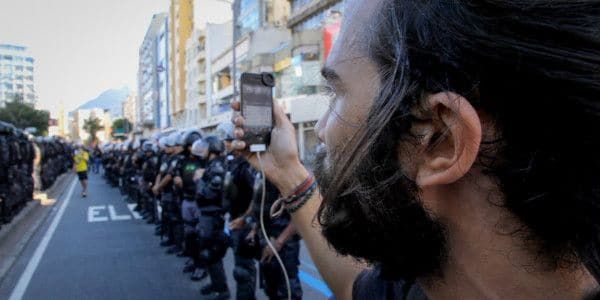Eye For Film >> Movies >> Black Code (2016) Film Review
Black Code
Reviewed by: Jennie Kermode

It's one of those details only writers and academics notice: word counts are getting shorter. Why? if it's over 600 words, many online publishers say, no-one will read all of it. To be honest, 500 is pushing it. It didn't used to be like this. Studies suggest that using the internet actually makes our attention spans shorter. It's not so much a failing as an adaptive response: we're becoming wired to take in large quantities of disparate pieces of information. Nicholas de Pencier's film is cinema for the internet age.
Is the internet a force for good or evil? Newspapers, now on the decline, miss the point when they ask this question: it's like asking if water is good or evil (we need it to live but it can drown us - does that give it moral value?). De Pencier ditches this nonsense at the outset. He's interested in exploring the new world we live in, looking at the ways it can help or harm, exploring the techniques by which different groups are learning to harness it like sailors on a turbulent sea. Surveillance, hacking, big data, 'digital exhaust' - these are the things that can send a Tibetan activist to prison or liberate a young man falsely accused of throwing a Molotov cocktail, give rise to democratising citizen journalism or enable unprecedented levels of state control. de Pencier wants to explore all such phenomena. Is this cinema, or would it work better as a series of interconnected short online videos? We surf from one subject to another as he attempts to present us with a holistic picture, but unless you're pretty well versed in the underlying issues to begin with, you may struggle to make sense of it all.

This film was inspired by Black Code: Inside The Battle For Cyberspace, a memoir written by Ronald J Deibert of Toronto University's Citizen Lab, and Deibert is heavily involved, talking about the work his organisation does to combat espionage and reflecting on the state of play around the world. His narrative is the closets the fuilm comes to creating a coherent thread as its dense packing in of information from many different contexts comes at the expense of well-constructed argument. Its principal plus point is the degree to which it focuses on the importance of the internet in economically disadvantaged countries which are often ignored by such analyses. There's an express recognition here that where the internet was once damaged by rich Western and Northern nations, it is having its most dramatic effect in the global South and East as access to information and the potential for mass communication reaches people who in many cases have previously enjoyed only a basic education and have had little chance to influence the world around them.
Through the excitement of new opportunities brought about by this, De Pencier weaves cautionary tales. He endeavours to equip his viewers with tools through which to better protect their privacy, and he looks at the way cyber technologies have been exploited not just be governments but by political extremists. The internet has liberated minority groups by helping them to connect, but it has also made them vulnerable. It has given women the chance to assert themselves politically, but cultures of rampant misogyny have led, in some cases, to murder.
Any of these subjects might have been the focus of an in-depth documentary. Unable to explore them in any depth because he's trying to cover so much, De Pencier gives us the lightweight, 400 word version. There is a danger that we will come away from all this having acquired a good deal of knowledge but understanding little. Attempts to draw it all together through a human rights focus flounder because this is never clearly set out and those who most need to understand it are least likely to have the contextual background needed to do so at the outset. It is an impressively rich film, presenting a sea of information - but we are not waving.
Reviewed on: 19 Feb 2018
















